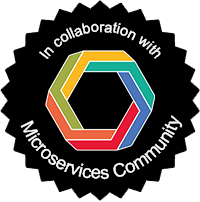Microservices 2020
The International Conference on Microservices is a forum for the discussion of all aspects of microservices: their design, programming, and operations. The 2020 edition of the conference (Microservices 2020) will take place in Bologna, Italy. Dates and venue will be announced shortly.
The conference’s overarching aim is to bring together industry and academia, to foster discussion on practice and research of microservices.
Microservices 2020 is part of a conference series started with Microservices 2017 which successfully brought together many international practitioners and researches interested in the software paradigm of microservices. During Microservices 2017 the Microservices Community was founded with the aims of sharing of knowledge, fostering of collaborations, and organising events around microservices. Like Microservices 2019, this edition will be co-located and intertwined with the first international edition of the Meeting on Microservices (the first national edition took place in Bologna, Italy), an event specifically oriented towards companies where invited speakers from industry report success stories, best practices, current challenges, and attendees participate to discussion panels on the adoption and evolution of microservices in production.
Keynote Speakers

Microservices beyond COVID-19
Antonio Brogi
University of Pisa (IT)
Microservices & Cyber Security
The general theme of Microservices 2020 is the interplay between microservices and cyber security.
On one hand, the adoption of microservices is fostering the adoption of new architectural styles and software construction paradigms; understanding the security properties (or the emerging vulnerabilities) of the resulting constructs calls for the development of a fresh mindset in analysts and testers alike. In addition, the additional middleware layers often proposed for the management of microservice-based architectures could expand the attack surface of the systems. On the other hand, the same frameworks could instead prove valuable allies to collect security-relevant information and to coordinate defenses.
These considerations are about the intrinsic interplay between the fields of microservices and security. However, it should be noted that the context is peculiarly sensitive to them. Microservices are adopted as an accelerator of Digital Transformation, as the successful past edition of the conference proved, and security issues should be a primary concern, possibly taking the chance to integrate security-by-design into the microservice-led revolution in software development.
Microservices welcomes both theoretical and experimental submissions on topics ranging from formal frameworks to industrial experience reports and demonstrations. Presentations will be selected based on abstract submissions of maximum two pages. See the call for papers for details.
Theme and Topics
The theme of this edition is the interplay between microservices and the cyber security.
- On the one hand, the adoption of microservices is fostering the adoption of new architectural patterns and software construction practices; understanding the security properties (or the emerging vulnerabilities) of the resulting constructs calls for the development of a fresh mindset in analysts, designers and testers alike. In addition, the additional middleware and infrastructure typically proposed for the management of microservice-based architectures could expand the attack surface of the systems.
- On the other hand, the same frameworks could instead prove valuable allies to collect security-relevant information and to coordinate defenses. The above considerations concern the intrinsic interplay between the fields of microservices and security. The broader application context is peculiarly sensitive to them: microservices are often adopted as an accelerator of digital transformations as the successful past edition(s) of the conference have shown. In this light, security issues should be a primary concern for microservices researchers and practitioners, as they provide an opportunity to integrate security-by-design into the recent advances in software development - triggered and amplified by microservices principles, patterns, and technologies.
Topics of interest are not limited to our cyber security theme. We are interested in all aspects and phases of the design and implementation of microservice architectures:
- Software engineering methods for microservices, specifically (but not limited to) agile service design practices, behavior- and domain-driven design
- Identification, specification, and realization of candidate services
- Patterns for IDEAL cloud-native application architectures; service API design and management
- Microservices infrastructure components: API gateways, side cars, and service meshes; reactive messaging brokers; service registries; service containers and cluster managers; infrastructure as code
- Function-as-a-service and serverless cloud offerings; service-based event sourcing and data streaming architectures
- Security and other service quality concerns (consistency, availability, recoverability) in microservices; dealing with General Data Protection Regulation (GDPR) compliance and other data privacy requirements
- Testing for microservices: unit tests, system tests, acceptance and regression tests, test-driven service development
- Formal models for microservices
- Verification (both static and runtime) of microservice systems
- DevOps for microservices, in particular (but not limited to) continuous deployment and distributed monitoring
- Microservice management: fault, configuration, accounting, performance, security
- Discovery/recovery and reverse engineering of microservices solutions
- Microservice evolution
- Programming languages, notations, and techniques for microservices
- Empirical studies of microservices adoption
We solicit contributed talks based work in progress, scientific work published or submitted for publication, or practical experience reports. Authors wishing to present their work are invited to submit extended abstracts following the submission guidelines.. Abstracts and presentations must be in English.
Please contact us if you have questions.
Submission
A submission should describe a talk to be given at the conference in the form of extended abstracts with a maximum of two pages.
Submissions can be based on work in progress, scientific work published or submitted for publication, practical experience reports, or practical tool demonstrations.
They must be prepared using the EasyChair template (LaTeX, MS Word), be in PDF format, printable in black and white on A4 paper, and interpretable by common PDF tools. Submissions must be in English.
Contributions will be reviewed and selected by the Program Committee. Extended abstracts of accepted contributions will be available electronically before the conference.
Contributions may be submitted via EasyChair by clicking the button below. The submission deadline is June 10th, 2020 AoE. Resubmissions are allowed until the submission deadline.
For more details on the conference’s scope and topics see the call for papers.



